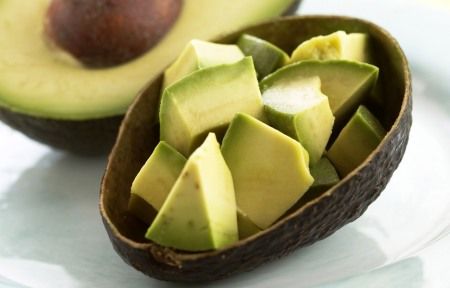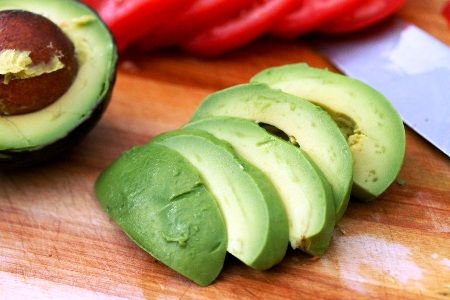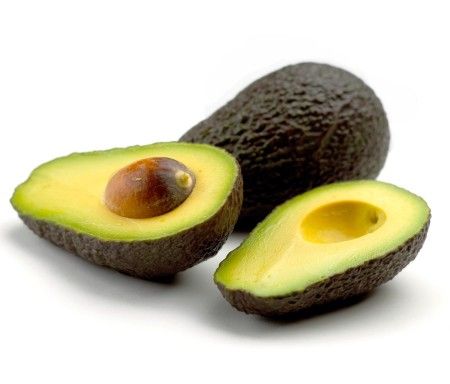
Avocado Nutrition Facts
Botanical name: Persea Americana
Spanish conquistadors had their own historian, Oviedo, who reported
positively about avocados discovered in Mexico around 1519. But this
interesting fruit has graced Central and South America for perhaps 10,000
years, according to the avocado-inspired drawings and artifacts found in early
Aztec settlements.
A judge from Santa Barbara took the first Mexican avocado trees to
California in 1871. California now grows 90% of the U.S. avocado crop in more
than 6,000 groves.
To enjoy an avocado (also called an "alligator pear"), it
first has to be prepared. A common chef's maneuver: cut around the long side of
the fruit down to the seed with a large knife. Twist the top half off like a
jar lid. Then firmly tap the knife blade on the center of the seed a few times
until it sticks. Practice makes perfect. Twist the knife and voilà – it's out.
Carefully score the avocado flesh without nicking the peel, and then scoop it
out with a spoon.
Health Benefits of Avocado
When it comes to nutrition, avocados are in a class by themselves
because of the unusually large number of benefits they offer - more than 20,
last count. Loaded with fiber, one avocado contains 36% of the daily
requirement of vitamin K, 30% of the folate, and 20% each of the daily
requirements of pantothenic acid (vitamin B5, needed to break down
carbohydrates), vitamin B6, vitamin C, and potassium - more than twice the
potassium of a banana. Vitamin E, niacin, and riboflavin levels deserve
honorable mention. Eaten with other foods, your body is better able to absorb
the nutrients, such as alpha- and beta-carotene and lutein.
Avocado is one of the few fruits that will provide you with
"good" fats. That means it can help keep your cholesterol levels
already in the healthy range, and help lower your risk for heart disease.
Avocados are one of the best fruits for your health. See: The Best and
Worst Vegetables to Eat
Avocado Nutrition Facts
Serving Size: One avocado, peeled (136 grams)
- Calories: 227
- Fat: 18 g
- Saturated Fat: 3 g
- Carbohydrates: 12 g
- Fiber: 9 g
- Sodium: 3 g
Studies Done on Avocado
Loosely described, lipids, their derivatives, and related substances
are fatty acids. Scientists discovered only 40 years ago or so that they're not
just simple building blocks, but perform complex, cell-regulating tasks on a
molecular level, like messaging hormones, for example.
One study was undertaken to see if avocados might have more lipids than
other fruits and vegetables, which, while rich in carotenoids, are lipid
challenged, impeding nutrient absorption. Researchers found that adding
avocados to salad and salsa (foods used in the study) can significantly enhance
your body's ability to take up the benefits of carotenoids, due primarily to
the lipids in the avocados1.
The yellow-green color of avocados prompted another study, since color
in other plant-based foods indicates carotenoid and other "bioactive"
action, indicating possible cancer-fighting properties. The premise was that
the monounsaturated fat in avocados might help your body absorb important
bioactive carotenoids in combination with other fruits and vegetables, and
therefore significantly reduce your risk of cancer2.
Another study showed that the lipids extracted from avocados might
prove photo-protective against harmful effects of radiation, such as sun
damage, inflammation, and even skin cancer, if ingested before exposure3.
Avocado Healthy Recipe: Crisp and Crunchy Green Salad
Avocado Healthy Recipes
Ingredients:
- 1 head red- or green-leaf lettuce, or Romaine
- 1 whole avocado, chopped into chunks
- 1 cup of sunflower seed sprouts
- 1 medium tomato, chopped small
- 1 medium cucumber
- ¼ cup toasted pine nuts
Dressing:
- ¼ cup olive oil
- 1/8 cup balsamic vinegar
- 1 clove garlic, crushed
- 1 teaspoon Dijon mustard
Procedure:
- Prepare the lettuce leaves and place in a large bowl.
- Cut up the remaining vegetables and add them to the salad.
- Toast the pine nuts in a dry skillet on medium heat for 4-5 minutes or until lightly browned.
- Whisk together the olive oil and vinegar, add the crushed garlic, pour over the salad and serve immediately. Makes 4 servings.
Avocado Fun Facts
Because ancient Aztecs considered avocados a fertility fruit, and the
Mayans used them as an aphrodisiac, a stigma against the fruit carried clear
through the 19th century. Growers finally launched a campaign to convince
consumers they could eat avocados without compromising themselves.
Summary
Not just for guacamole, sliced avocados lend a buttery texture and
delicious flavor to sandwiches and salads. But the health benefits of avocados
are stellar, especially with the lipid content that allows your body to absorb
nutrients they wouldn't otherwise.
Avocados are also very high in essential vitamins and minerals,
including fiber, vitamins K, B5, B6 and C, folate, and potassium.
Other sources:
http://nutritiondata.self.com/facts/fruits-and-fruit-juices/1844/2
http://www.avocado.org/recipe-details/view/31488/baby%27s-first-california-avocado
http://www.mnn.com/food/healthy-eating/stories/avocado-nutrition-facts-great-benefits-from-a-mighty-fruit
http://www.avocado.com
http://lipidlibrary.aocs.org/Lipids/whatlip/index.htm
http://www.bonappetit.com/recipes
References:
1 http://www.ncbi.nlm.nih.gov/pubmed/15735074, Carotenoid absorption
from salad and salsa by humans is enhanced by the addition of avocado or
avocado oil, Aug. 2012
2 http://www.ncbi.nlm.nih.gov/pubmed/15629237, Inhibition of prostate
cancer cell growth by an avocado extract: role of lipid-soluble bioactive
substances, Aug. 2012
3 http://www.ncbi.nlm.nih.gov/pubmed/20978772, Polyhydroxylated fatty
alcohols derived from avocado suppress inflammatory response and provide
non-sunscreen protection against UV-induced damage in skin cells, Aug. 2012Article Source: http://foodfacts.mercola.com/avocado.html
















































No comments:
Post a Comment